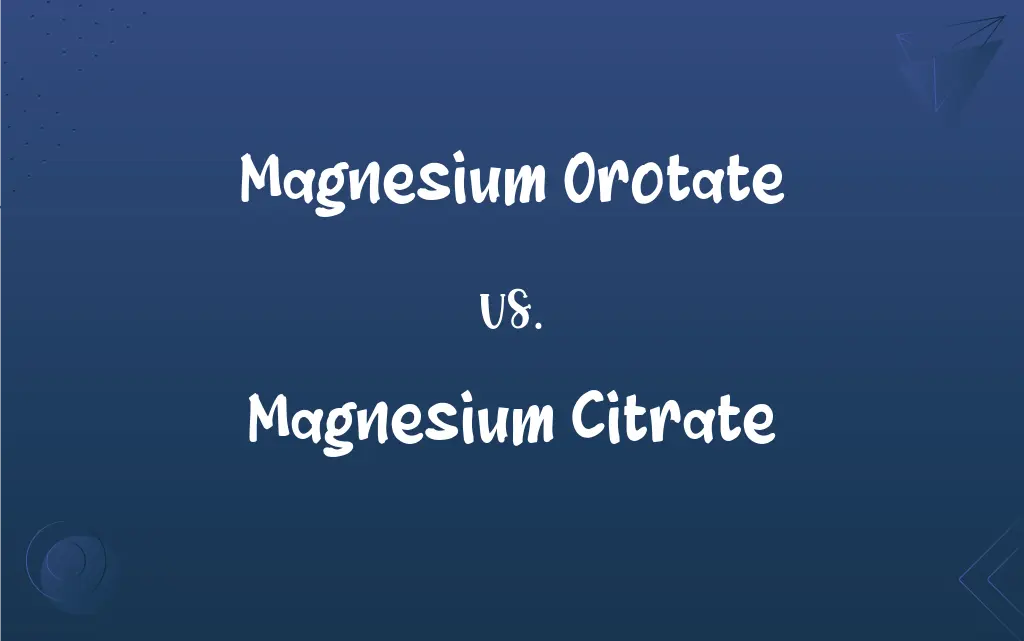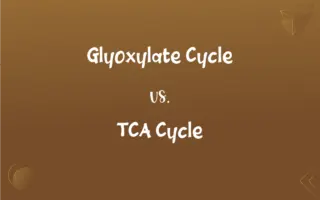Magnesium Orotate vs. Magnesium Citrate: What's the Difference?
Edited by Harlon Moss || By Aimie Carlson || Published on January 9, 2024
Magnesium orotate is a compound combining magnesium with orotic acid, often used for heart health, while magnesium citrate combines magnesium with citric acid, commonly used as a laxative.

Key Differences
Magnesium orotate is a compound formed by the combination of magnesium and orotic acid. It's typically used for its potential cardiovascular benefits. Magnesium citrate, on the other hand, is a fusion of magnesium and citric acid, known for its laxative properties and effectiveness in treating constipation.
In terms of bioavailability, magnesium orotate is considered to be highly bioavailable, meaning the body can easily absorb and utilize it. Magnesium citrate also has good bioavailability but is primarily recognized for its ability to attract water into the intestines, aiding bowel movements.
When it comes to health benefits, magnesium orotate is often recommended for supporting heart health and improving athletic performance. Magnesium citrate, in contrast, is frequently suggested for relieving constipation and sometimes for preparing the bowel before surgical procedures.
Regarding usage, magnesium orotate is usually taken as a dietary supplement for general health and specific cardiac conditions. Magnesium citrate is commonly found in over-the-counter laxatives and is often used for short-term relief of constipation.
Side effects of magnesium orotate are generally rare and mild when taken in recommended doses. Magnesium citrate, however, can lead to side effects like diarrhea and dehydration, especially if overused or taken in large amounts.
ADVERTISEMENT
Comparison Chart
Primary Use
Heart health and athletic performance
Laxative, relieves constipation
Chemical Composition
Magnesium + Orotic Acid
Magnesium + Citric Acid
Bioavailability
High, easily absorbed
High, attracts water to intestines
Typical Dosage Form
Dietary supplement
Over-the-counter laxative
Common Side Effects
Rare and mild
Diarrhea, dehydration if overused
ADVERTISEMENT
Magnesium Orotate and Magnesium Citrate Definitions
Magnesium Orotate
A bioavailable form of magnesium, promoting efficient absorption in the body.
Due to its high bioavailability, magnesium orotate is effective even in smaller doses.
Magnesium Citrate
A compound of magnesium and citric acid, primarily used as a laxative.
Magnesium citrate is often prescribed to relieve occasional constipation.
Magnesium Orotate
Beneficial for improving sleep quality and reducing anxiety.
Taking magnesium orotate at night can help in improving sleep patterns.
Magnesium Citrate
A readily absorbable form of magnesium, aiding in digestive health.
Magnesium citrate not only helps with constipation but also supports overall digestive wellness.
Magnesium Orotate
Often used to support cellular and muscle function.
Magnesium orotate plays a crucial role in maintaining healthy muscle function.
Magnesium Citrate
Commonly used in over-the-counter remedies for quick relief of constipation.
For immediate constipation relief, many turn to magnesium citrate solutions.
Magnesium Orotate
A compound of magnesium and orotic acid, used for cardiovascular health.
Magnesium orotate is recommended by some health professionals for heart disease prevention.
Magnesium Citrate
Can lead to electrolyte imbalance if overused.
Excessive use of magnesium citrate can cause dehydration and electrolyte disturbances.
Magnesium Orotate
A supplement known for enhancing athletic performance and energy production.
Athletes sometimes take magnesium orotate for better endurance and recovery.
Magnesium Citrate
Known for its ability to hydrate the bowel and ease bowel movements.
To prepare for a colonoscopy, magnesium citrate can be used for bowel cleansing.
FAQs
Can magnesium orotate improve athletic performance?
Yes, it's known to enhance endurance and recovery in athletes.
What is magnesium citrate?
A fusion of magnesium and citric acid, mainly used as a laxative.
Are there side effects to taking magnesium orotate?
Side effects are rare and mild when taken in recommended doses.
What is magnesium orotate?
A compound combining magnesium with orotic acid, often used for heart health.
Is magnesium citrate good for constipation?
Yes, it's effective in treating constipation due to its laxative properties.
How quickly does magnesium citrate work?
It typically works within 3 to 6 hours after intake.
What are the side effects of magnesium citrate?
Common side effects include diarrhea and dehydration if overused.
Why is magnesium citrate used before surgeries?
It's used to cleanse the bowel before surgical procedures.
Is magnesium citrate safe for long-term use?
It's generally safe for short-term use; long-term use should be monitored by a healthcare professional.
Is magnesium orotate suitable for everyone?
Most people can take it safely, but it's best to consult with a healthcare provider.
How does magnesium orotate support heart health?
It aids in cardiovascular function and can prevent heart diseases.
Does magnesium orotate interact with medications?
It can interact with certain medications, so it's important to consult a doctor.
Can magnesium orotate help with anxiety?
Yes, it can reduce anxiety and improve sleep quality.
Does magnesium orotate aid in energy production?
Yes, it plays a role in cellular energy production.
Can children take magnesium citrate?
It's advisable to consult a pediatrician before giving it to children.
Can magnesium citrate cause dehydration?
Yes, especially if taken in large amounts or overused.
Can magnesium orotate be taken daily?
Yes, when used as directed, it can be taken daily.
Is magnesium citrate effective in small doses?
Yes, even small doses can be effective for bowel movements.
Is magnesium orotate beneficial for muscle function?
Yes, it supports healthy muscle and cellular function.
Should I take magnesium citrate on an empty stomach?
It's usually taken with a full glass of water on an empty stomach for best results.
About Author
Written by
Aimie CarlsonAimie Carlson, holding a master's degree in English literature, is a fervent English language enthusiast. She lends her writing talents to Difference Wiki, a prominent website that specializes in comparisons, offering readers insightful analyses that both captivate and inform.
Edited by
Harlon MossHarlon is a seasoned quality moderator and accomplished content writer for Difference Wiki. An alumnus of the prestigious University of California, he earned his degree in Computer Science. Leveraging his academic background, Harlon brings a meticulous and informed perspective to his work, ensuring content accuracy and excellence.




































































